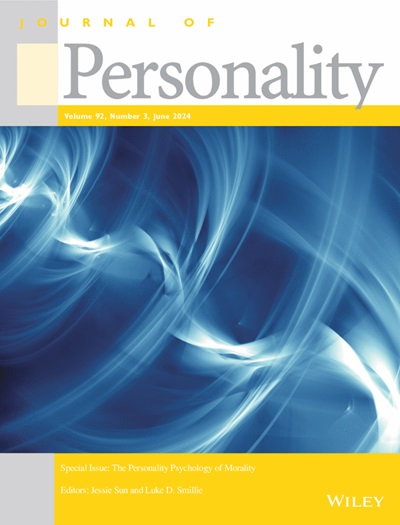Types of Analytic Thinkers
IF 2.7
1区 心理学
Q1 Psychology
引用次数: 0
Abstract
ObjectiveAnalytic thinking dispositions are trait‐like individual differences in epistemic values and attitudes toward putting effort into thinking. Much‐studied dispositions include actively open‐minded thinking (AOT), the need for cognition (NFC), and cognitive reflection (CRT). However, it is unclear how different analytic thinking dispositions relate to each other.MethodThree studies (分析思考者的类型
分析性思维倾向是在认知价值和对努力思考的态度上的特质性个体差异。研究较多的倾向包括积极开放思维(AOT)、认知需求(NFC)和认知反思(CRT)。然而,目前还不清楚不同的分析思维倾向是如何相互关联的。方法3项研究(N = 339, N = 400, N = 2484)采用潜在剖面分析探讨这些倾向的组合。结果出现了三种不同性质的“高度分析思考者”和两种非分析思考者。总体而言,分析型思考者在这三种性格上得分都很高,而开放型思考者在AOT和NFC上得分很高,但在CRT上得分不高,而反思型思考者的模式正好相反。这些特征在社会意义的结果上有所不同,比如对错误信息的敏感性和阴谋心理。虽然整体分析型和开放型具有传统意义上分析型思考者所期望的理性思维结果,但反思型思考者却没有。结论分析性思维倾向是一个侧面结构,其不同组成部分应分别进行评估。将AOT和NFC与CRT合并为复合变量的做法是不合理的,因为它有错误标记参与者和混淆研究结果的风险。
本文章由计算机程序翻译,如有差异,请以英文原文为准。
求助全文
约1分钟内获得全文
求助全文
来源期刊

Journal of Personality
PSYCHOLOGY, SOCIAL-
CiteScore
9.60
自引率
6.00%
发文量
100
期刊介绍:
Journal of Personality publishes scientific investigations in the field of personality. It focuses particularly on personality and behavior dynamics, personality development, and individual differences in the cognitive, affective, and interpersonal domains. The journal reflects and stimulates interest in the growth of new theoretical and methodological approaches in personality psychology.
 求助内容:
求助内容: 应助结果提醒方式:
应助结果提醒方式:


